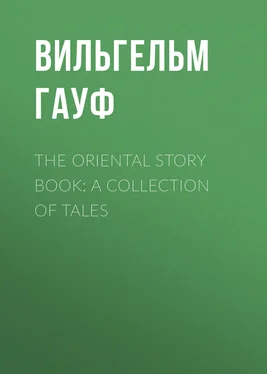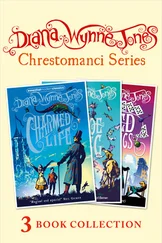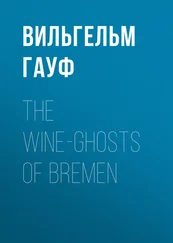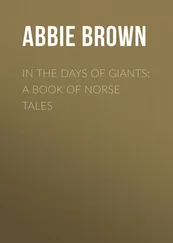Вильгельм Гауф - The Oriental Story Book - A Collection of Tales
Здесь есть возможность читать онлайн «Вильгельм Гауф - The Oriental Story Book - A Collection of Tales» — ознакомительный отрывок электронной книги совершенно бесплатно, а после прочтения отрывка купить полную версию. В некоторых случаях можно слушать аудио, скачать через торрент в формате fb2 и присутствует краткое содержание. Жанр: Сказка, foreign_antique, foreign_prose, foreign_children, на английском языке. Описание произведения, (предисловие) а так же отзывы посетителей доступны на портале библиотеки ЛибКат.
- Название:The Oriental Story Book: A Collection of Tales
- Автор:
- Жанр:
- Год:неизвестен
- ISBN:нет данных
- Рейтинг книги:4 / 5. Голосов: 1
-
Избранное:Добавить в избранное
- Отзывы:
-
Ваша оценка:
- 80
- 1
- 2
- 3
- 4
- 5
The Oriental Story Book: A Collection of Tales: краткое содержание, описание и аннотация
Предлагаем к чтению аннотацию, описание, краткое содержание или предисловие (зависит от того, что написал сам автор книги «The Oriental Story Book: A Collection of Tales»). Если вы не нашли необходимую информацию о книге — напишите в комментариях, мы постараемся отыскать её.
The Oriental Story Book: A Collection of Tales — читать онлайн ознакомительный отрывок
Ниже представлен текст книги, разбитый по страницам. Система сохранения места последней прочитанной страницы, позволяет с удобством читать онлайн бесплатно книгу «The Oriental Story Book: A Collection of Tales», без необходимости каждый раз заново искать на чём Вы остановились. Поставьте закладку, и сможете в любой момент перейти на страницу, на которой закончили чтение.
Интервал:
Закладка:
The owl ended, and again wiped her eyes with her wing, for the narration of her wo had called forth tears. The Caliph was plunged in deep meditation by the story of the Princess. “If I am not altogether deceived,” said he, “you will find that between our misfortunes a secret connection exists; but where can I find the key to this enigma?”
The owl answered him, “My lord! this also is plain to me; for once, in early youth, it was foretold to me by a wise woman, that a stork would bring me great happiness, and perhaps I might know how we may save ourselves.”
The Caliph was much astonished, and inquired in what way she meant.
“The enchanter who has made us both miserable,” said she, “comes once every month to these ruins. Not far from this chamber is a hall; there, with many confederates, he is wont to banquet. Already I have often watched them: they relate to one another their shameful deeds—perhaps he might then mention the magic word which you have forgotten.”
“Oh, dearest Princess!” exclaimed the Caliph: “tell us—when will he come, and where is the hall?”
The owl was silent a moment, and then said: “Take it not unkindly, but only on one condition can I grant your wish.”
“Speak out! speak out!” cried Chasid. “Command; whatever it may be, I am ready to obey.”
“It is this: I would fain at the same time be free; this, however, can only take place, if one of you offer me his hand.” At this proposition the storks seemed somewhat surprised, and the Caliph beckoned to his attendant to step aside with him a moment. “Grand-Vizier,” said the Caliph before the door, “this is a stupid affair, but you can set it all right.”
“Thus?” rejoined he; “that my wife, when I go home, may scratch my eyes out? Besides, I am an old man, while you are still young and unmarried, and can better give your hand to a young and beautiful princess.”
“Ah! that is the point,” sighed the Caliph, as he mournfully drooped his wings: “who told you she is young and fair? That is equivalent to buying a cat in a sack!” They continued to converse together for a long time, but finally, when the Caliph saw that Mansor would rather remain a stork than marry the owl, he determined sooner, himself, to accept the condition. The owl was overjoyed; she avowed to them that they could have come at no better time, since, probably, that very night, the sorcerers would assemble together.
She left the apartment with the storks, in order to lead them to the saloon; they went a long way through a gloomy passage, until at last a very bright light streamed upon them through a half-decayed wall. When they reached this place, the owl advised them to halt very quietly. From the breach, near which they were standing, they could look down upon a large saloon, adorned all around with pillars, and splendidly decorated, in which many colored lamps restored the light of day. In the midst of the saloon stood a round table, laden with various choice meats. Around the table extended a sofa, on which eight men were seated. In one of these men the storks recognised the very merchant, who had sold them the magic powder. His neighbor desired him to tell them his latest exploits; whereupon he related, among others, the story of the Caliph and his Vizier.
“What did you give them for a word?” inquired of him one of the other magicians.
“A right ponderous Latin one—Mutabor.”
CHAPTER V
WHEN the storks heard this through their chasm in the wall, they became almost beside themselves with joy. They ran so quickly with their long feet to the door of the ruin, that the owl could scarcely keep up with them. Thereupon spoke the Caliph to her: “Preserver of my life and that of my friend, in token of our eternal thanks for what thou hast done for us, take me as thy husband.” Then he turned to the East: three times they bowed their long necks towards the sun, which was even now rising above the mountains, and at the same moment exclaimed “Mutabor!” In a twinkling they were restored, and in the excessive joy of their newly-bestowed life, alternately laughing and weeping, were folded in each other’s arms. But who can describe their astonishment when they looked around? A beautiful woman, attired as a queen, stood before them. Smiling, she gave the Caliph her hand, and said, “Know you your screech-owl no longer?” It was she; the Caliph was in such transports at her beauty and pleasantness, as to cry out, that it was the most fortunate moment in his life, when he became a stork.
The three now proceeded together to Bagdad. The Caliph found in his dress, not only the box of magic powder, but also his money-bag. By means thereof, he purchased at the nearest village what was necessary for their journey, and accordingly they soon appeared before the gates of the city. Here, however, the arrival of the Caliph excited great astonishment. They had given out that he was dead, and the people were therefore highly rejoiced to have again their beloved lord.
So much the more, however, burned their hatred against the impostor Mizra. They proceeded to the palace, and caught the old magician and his son. The old man the Caliph sent to the same chamber in the ruin, which the princess, as a screech-owl, had inhabited, and there had him hung; unto the son, however, who understood nothing of his father’s arts, he gave his choice,—to die, or snuff some of the powder. Having chosen the latter, the Grand-Vizier presented him the box. A hearty pinch, and the magic word of the Caliph converted him into a stork. Chasid had him locked up in an iron cage, and hung in his garden.
Long and happily lived Caliph Chasid with his spouse, the Princess; his pleasantest hours were always those, when in the afternoon the Vizier sought him; and whenever the Caliph was in a very good humor, he would let himself down so far, as to show Mansor how he looked, when a stork. He would gravely march along, with rigid feet, up and down the chamber, make a clattering noise, wave his arms like wings, and show how, in vain, he had prostrated himself to the East, and cried out, Mu—mu. To the Princess and her children, this imitation always afforded great amusement: when, however, the Caliph clattered, and bowed, and cried out, too long, then the Vizier would threaten him that he would disclose to his spouse what had been proposed outside the door of the Princess Screech-owl!
When Selim Baruch had finished his story, the merchants declared themselves delighted therewith. “Verily, the afternoon has passed away from us without our having observed it!” exclaimed one of them, throwing back the covering of the tent: “the evening wind blows cool, we can still make a good distance on our journey.” To this his companions agreed; the tents were struck, and the Caravan proceeded on its way in the same order in which it had come up.
They rode almost all the night long, for it was refreshing and starry, whereas the day was sultry. At last they arrived at a convenient stopping-place; here they pitched their tents, and composed themselves to rest. To the stranger the merchants attended, as a most valued guest. One gave him cushions, a second covering, a third slaves; in a word, he was as well provided for as if he had been at home. The hottest hours of the day had already arrived, when they awoke again, and they unanimously determined to wait for evening in this place. After they had eaten together, they moved more closely to each other, and the young merchant, turning to the oldest, addressed him: “Selim Baruch yesterday made a pleasant afternoon for us; suppose Achmet, that you also tell us something, be it either from your long life, which has known so many adventures, or even a pretty Märchen.”
Upon these words Achmet was silent some time, as if he were in doubt whether to tell this or that; at last he began to speak: “Dear friends, on this our journey you have proved yourselves faithful companions, and Selim also deserves my confidence; I will therefore impart to you something of my life, of which, under other circumstances, I would speak reluctantly, and, indeed, not to any one: The History of the Spectre Ship.”
Читать дальшеИнтервал:
Закладка:
Похожие книги на «The Oriental Story Book: A Collection of Tales»
Представляем Вашему вниманию похожие книги на «The Oriental Story Book: A Collection of Tales» списком для выбора. Мы отобрали схожую по названию и смыслу литературу в надежде предоставить читателям больше вариантов отыскать новые, интересные, ещё непрочитанные произведения.
Обсуждение, отзывы о книге «The Oriental Story Book: A Collection of Tales» и просто собственные мнения читателей. Оставьте ваши комментарии, напишите, что Вы думаете о произведении, его смысле или главных героях. Укажите что конкретно понравилось, а что нет, и почему Вы так считаете.












